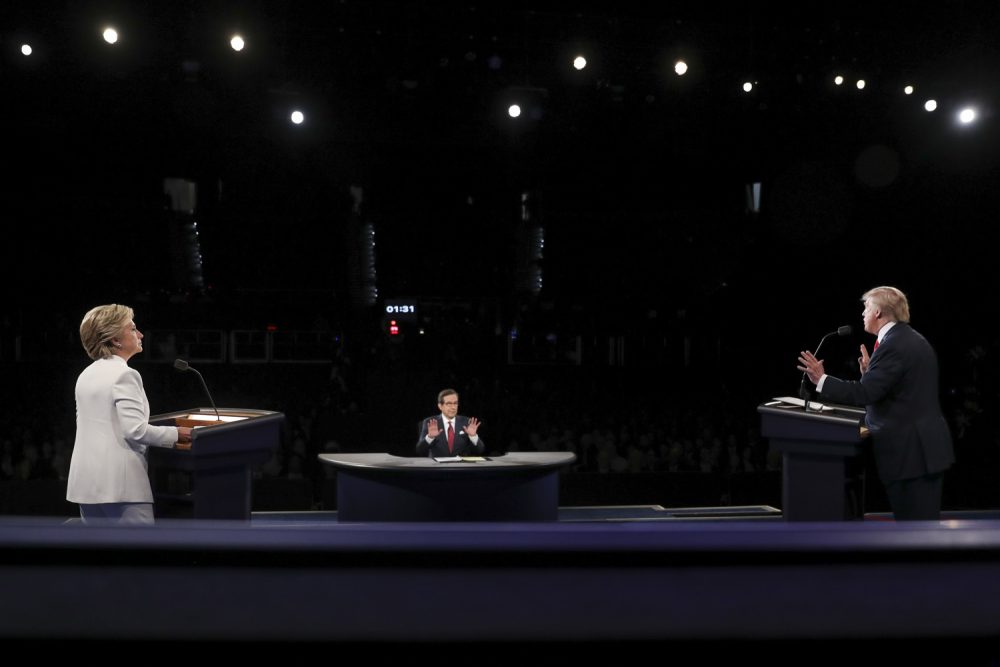Advertisement
Final Debate Scorecard: Chris Wallace Wins, Democracy Does Not

COMMENTARY
The third and final presidential debate between Donald Trump and Hillary Clinton won’t move the electoral needle much. But it nevertheless produced a clear winner and a clear loser that could both have significant ramifications for the political process.
On the bright side, Chris Wallace provided a template for future debate moderators on how to manage rambunctious presidential candidates. He was the evening’s winner.
Wallace applied a simple formula to tease out differentiating responses from the candidates. He teed up a question by first summarizing each candidate’s position on an issue, asked a clear, pointed question, and then let the candidates speak without interruption. He avoided becoming part of the narrative.
And when the temperature in the debate hall rose, Wallace chose that moment to test Trump.
The method worked well on substantive issues because it didn’t provide a place to hide. When Trump, for instance, meandered by discussing NATO and Japan in response to a question about jobs and the economy, the confusion was plain to see. Similarly, when Clinton pivoted from a pay-to-play question about her foundation by reciting bullet points regarding its projects, her insincerity was evident.
Wallace utilized issues like the Supreme Court, abortion, immigration, the economy and the national debt to draw out the distinctions between the candidate’s positions. For the most part, the candidates actually addressed the subject matter of these questions. This was a major win for Wallace.
The debate descended to familiar depths, though, when Wallace veered into a question about “fitness” for office — a convenient catch-all for mudslinging. The moderator must have known that he had to eventually get to questions regarding Clinton and Wikileaks and Trump’s female accusers, so he tried to include most of them in one category. During this segment the debate turned temporarily nasty.
And when the temperature in the debate hall rose, Wallace chose that moment to test Trump.
He asked the candidate if he would accept the results of the election regardless of outcome. Trump refused to make such a pledge. This was a dark moment in the debate, and the U.S. electoral system became the loser of the evening.
It was reminiscent of the tactic that Trump used in the GOP primary. There, he threatened to run as a third-party candidate if he were to lose, falsely claiming that GOP primary rules were rigged against him in favor of "establishment" candidates.
As with most other things involving Trump, GOP leadership was flummoxed by the third-party threat. Rather than call him on his threats and challenge him, they refused to team up on his campaign and instead let Trump pick off one confused candidate after another.
Republicans had even convinced the candidates to sign a pledge to support the eventual winner of the primary, hoping to control Trump via his signature when he lost. That strategy backfired when Trump won, putting multiple GOP candidates in the unhappy position of having to either endorse Trump despite his myriad problematic statements or publicly renouncing their pledge.
Trump’s refusal to commit to accepting the outcome of the presidential contest thus has a history and shouldn’t be that surprising.
In fact, a more cynical view wouldn’t attribute this response to Trump’s ego, but to a Plan B of sorts.
Trump, the businessman, has always been obsessed with his brand. And the Trump brand could take a big hit if he loses to Clinton in a landslide. This outcome would be especially worrisome for those investors and family members exploring a Trump media empire. Would there be a better way to spawn a return to television by The Donald than to keep a large swath of his followers angry, unsettled — and tuned in — by refusing to accept the legitimacy of the election? That remains unclear.
...regardless of intent, this suggestion by a presidential candidate has a potential dark side that could be unprecedented if Trump is to lose.
But it is clear that, regardless of intent, this suggestion by a presidential candidate has a potential dark side that could be unprecedented if Trump is to lose.
A loss by Trump and subsequent refusal to accept the election results would call the very legitimacy of the new administration into question for millions of Trump supporters. This danger is what compelled Al Gore to eschew the bad advice of some of his Democratic political colleagues and set aside his challenge once the Supreme Court ruled on the outcome of the presidential election in 2000.
Trump’s eventual refusal could also be disastrous for the GOP. Its voters would have a more difficult time moving on were Trump to emerge post-election as a viable demagogue instead of a defeated candidate. In such a case, many of those attracted to the Trump campaign’s populism would not return to support the party’s traditional conservative candidates. Such a schism would create an existential challenge for the GOP.
Trump’s debate response raises the specter that, in contrast to every prior presidential election in modern U.S. history, there could be a risk that the nation won’t simply move on toward a peaceful transition once the outcome is officially tabulated.
Hence, the nation’s high anxiety continues.
